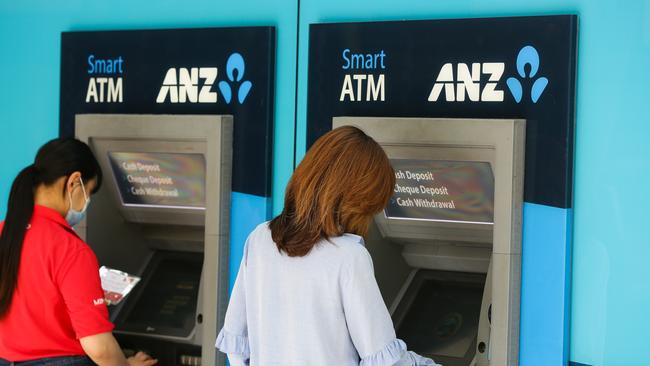Linfox Armaguard’s mission to become Australia’s cash king
Armaguard wants to be the nation’s top ATM provider after a spate of acquisitions in the past 18 months.

Linfox Armaguard is emerging as one of Australia‘s biggest providers of automatic teller machines, aiming to fill a gap in the market as the big four banks close more of their doors in regional areas and switch off ATMs outside their branches.
Armaguard has begun rolling out its own brand of ATMs after taking over RediATM and quietly acquiring machines from ANZ and CBA.
The company now owns about 2100 automatic teller machines across the country and is looking to add about another 1000 to its network to ensure Australians, particularly those living in regional areas, continue to have access to cash.
It comes as the latest data from the Reserve Bank shows cash is still king, despite retailers urging customers to pay with plastic rather than use hard currency, with total banknotes in circulation rising $1.6bn in December.
This is despite the share of cash payments continuing to fall, accounting for 27 per cent of consumer payments in 2019, compared to 37 per cent in 2016.
Linfox Armaguard chief executive Annette Carey told The Australian that in times of crisis people took comfort in having cash on hand and physical currency accounted for about half of all transactions totalling $10 or less such as newspapers, coffees and other day-to-day items.
But it’s not just small change. The highest denomination banknotes — $50 and $100 — account for around two-thirds of the notes in circulation, with demand for these two denominations growing but a faster rate than that of the lower denominations in recent years, with the RBA’s note issue department estimating the bills could stay in circulation for close to 150 years.
But the big banks have been rationalising their ATM networks, with the number of machines declining 15 per cent in the past four years, according to the RBA, despite cash accounting for more than a quarter of all consumer payments.
“Ever since 2017 off the back of the Hayne Royal Commission when the majors stopped charging non-bank customers to use their ATMS, the whole model of big banks having lots of ATMs, particularly ones not located in their own branches, became non-viable,” Ms Carey said.
“They used to make money by charging people who weren’t their customers but once that stopped that really started to kill the model. So the banks have been in the process of reducing their ATM fleets.
“But there was an opportunity, and this has happened overseas as well, for an industry solution to share the infrastructure around offsite ATMs and Armaguard was keen to leverage its existing network - we have all these vaults around Australia to store cash and we are going to the banks and ATMs all the time anyway - to be the provider of that shared infrastructure.”
Rapidly expanding
Rival Prosegur is also hoping to fulfil that role, having acquired Westpac’s non-branch ATMs in 2019. But Armaguard has been rapidly expanding its network completing a spate of acquisitions including with RediATM, ANZ and CBA in the past 18 months.
NAB is the only major to not offload all or part of its offsite network, retaining its network of 900 non-branch ATMs.
Despite ATM charges being a bugbear of consumers, the fees are essential to keeping the cash machines running - many of which offer 24/7 access.
“There are quite a lot of costs associated with procuring the device, having a lease associated with it and then keeping it operational as well as keeping it cashed up,” Ms Carey said.
But these costs can be spread across an industry solution - such as the one Armaguard is rolling out. ANZ has already recognised this and allows its customers to access Armaguard’s ATMs free of charge. Armaguard is negotiating with other financial institutions in the hope of striking similar agreements.
“We know that paying ATM fees is very, very unpopular. We understand that,” Ms Carey said.
“But what the network and access arrangements allow is for any financial institution to enter into an access agreement to provide fee-free access to our network for their customers. That’s quite attractive, particularly for the smaller financial institutions, which wouldn’t have had that network in the first place.”
“There is a community service obligation on the industry and players in the industry to provide ready access to cash and the thing about an ATM is it’s 24/7. You’ve obviously got Bank at Post, which is another solution to provide fee free access around Australia, but again the bank’s pay for that not their customers.”
Last summer’s devastating bushfires and the Covid-19 pandemic has fuelled greater demand for hard currency - even if people aren’t spending it.
“It’s something that’s really important to many people in society to have access to cash. It’s tangible and if networks go down or you can still use it. That’s why I think during this crisis you’ve seen such an enormous increase in the amount of cash in circulation,” Ms Carey said.
“The recent stats from the Reserve Bank showed total bank notes in circulation rose by $1.6bn in December but that cash isn’t coming back into the economy. For every $100 that goes out the door from the Reserve Bank, we are only seeing, at the moment, at best about $20 come back and be processed, stored or collected by us,” Ms Carey said.








To join the conversation, please log in. Don't have an account? Register
Join the conversation, you are commenting as Logout